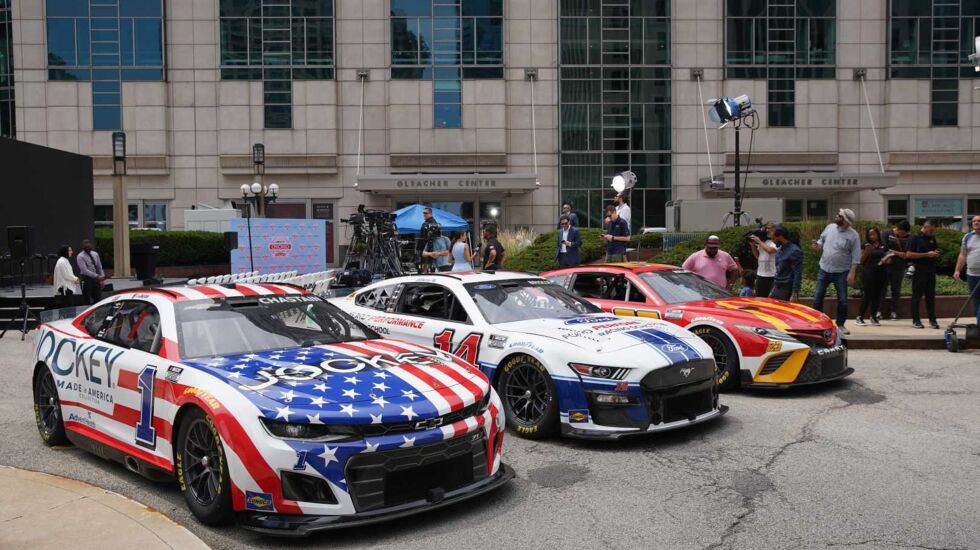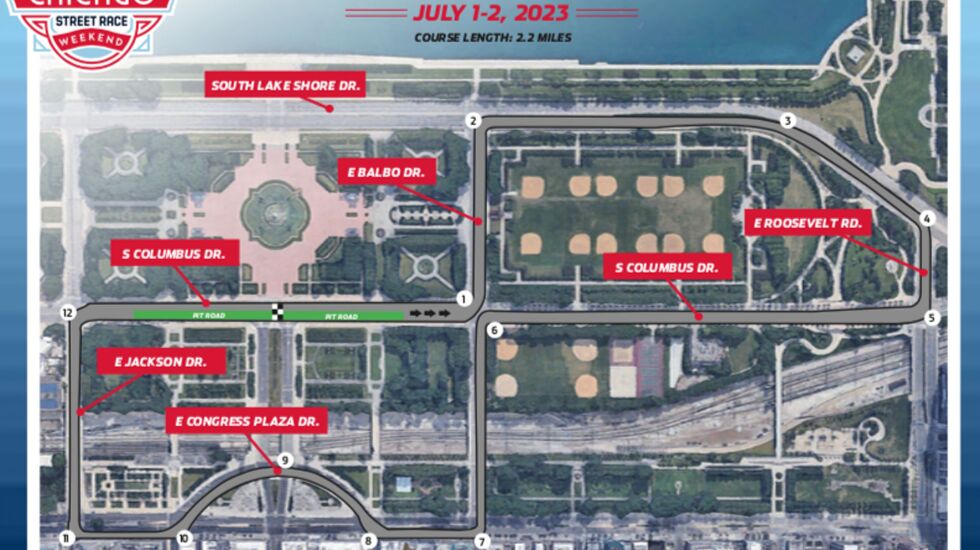
Chicago’s most iconic roadways — including DuSable Lake Shore Drive, Michigan Avenue and Columbus Drive — will be turned into a 12-turn, 2.2-mile showcase for the first street course race in NASCAR’s 75-year history.
Tuesday’s announcement came more than 40 years after then-Mayor Jane Byrne proudly unveiled plans for a Chicago Grand Prix race that would have run through the streets of Chicago over the Fourth of July weekend in 1981.
The political backlash was nearly as fast and furious as the race would have been — so much so that the event was canceled long before the green flag dropped.
Chicago’s second female mayor now is following the trail blazed by the first.
Mayor Lori Lightfoot said there will be three years of NASCAR races along the lake in downtown Chicago, with the first set for July 2, 2023 — if she wins a second term.
At the official announcement at Cityfront Plaza, Ben Kennedy, NASCAR’s senior vice president of racing and development strategy, called it the “the most monumental day in the history of our sport, NASCAR.”
“Next year, we’ll be celebrating our 75th anniversary. In 75 years, our sport has never had a street course,” Kennedy said.
“I’m excited and proud to announce to you today that, on July 2nd, 2023, the NASCAR Cup Series will be coming to downtown Chicago and racing here.”
In a panel discussion with NASCAR officials, Lightfoot said the “excitement among all of us — and particularly me — about the possibilities was just off the charts” when she started negotiations with NASCAR more than a year ago.
“This is a huge, huge sports town. That goes without saying. And the opportunity to bring something so unique as NASCAR to the city of Chicago — and I think it’s gonna be one of the most iconic racecourses, maybe ever. And introduce a whole new fan base to what NASCAR is about in the city of Chicago — we couldn’t pass up that opportunity,” the mayor said.

Noting that the NASCAR fan base is “broad and wide and deep,” Lightfoot called the Chicago race an “opportunity to ignite our tourism with a new, iconic event on the calendar.”
“You look at this crowd and you know why we need to bring NASCAR to Chicago. This is the tip of the iceberg. The excitement is now gonna be off the charts. People are really gonna be looking forward to July of 2023 when the cars hit the streets here,” she said.
NASCAR officials say they have “made a lot of bold changes” in recent years. But they expect the Chicago race to be the “most anticipated event of our season and one of the biggest sporting events in our country in 2023.”
Driver Bubba Wallace said what revs his engine most are the “unknowns.” Which is why he’s excited by the Chicago race.
“I don’t know what to expect going into this deal. I know these guys got a lot of work to do. And the city does, too, to get it ready. But it’s exciting,” said Wallace, who drives for 23XI Racing, co-owned by Michael Jordan and driver Denny Hamlin.
“Being in this city. Bringing NASCAR to this demographic. We talk about how representation matters. Exposing this sport to this area downtown with so much to do while the race is going on is super important. You’re gonna get that next Bubba Wallace that’s sitting in the stands like I was when I was 9 years old to be like, ‘I want to do this one day. But I want to be better.’ And I’m gonna tell ’em, ‘Good luck.’”
A proposed map shows a route that will have the Chicago skyline as a scenic backdrop — 2.2 miles running along Roosevelt Road, Columbus Drive, South DuSable Lake Shore Drive, Michigan Avenue and Jackson Boulevard.
The course kinks at Columbus and Balbo Drive, giving it a shape roughly like a figure-8, but the cars do not cross in the middle.
The start/finish line and pit road will be on Columbus Drive, where the course is seven lanes wide.
During a Zoom news conference after the announcement, Kennedy said Chicago roads are “in really good condition” and he anticipates only “a few small improvements will need to be made,” presumably at NASCAR’s expense.
Lightfoot noted downtown Chicago in general and Grant Park in particular play host to major events “all throughout our spring, summer and fall,” so “we know how to do this” and do it safely.
“I’m looking forward to showcasing our fantastic city on a global stage. We’re gonna do everything we can to make sure that this race is a love letter to the city of Chicago,” the mayor said.
Pressed to quantify the “cost to the city,” Lightfoot said those details have yet to be worked out with NASCAR. Instead, she focused on the benefits to Chicago. She expects the economic impact to be “substantial,” likening it to the $300 million pumped into the Chicago economy by Lollapalooza.
The mayor’s enthusiasm for the marquee event was not shared by downtown alderpersons whose constituents could be inconvenienced most.
Downtown Ald. Brendan Reilly (42nd) said he has no idea how he feels about the NASCAR proposal because local alderpersons were kept in the dark before the announcement.
“The Administration has allegedly been negotiating this event with NASCAR for many months now, yet they intentionally excluded members of the City Council who represent the impacted area from those conversations,” Reilly wrote in an email to the Sun-Times.
“That’s not transparency — it’s the opposite. Apparently, the Administration’s new approach, when it comes to major proposals that impact the City, is to hold secret meetings and completely disregard their co-equal partners in the legislative branch of city government.”
Reilly and fellow council members Pat Dowell (3rd) and Sophia King (4th) “aren’t happy about being blindsided by the Administration and excluded from these discussions, but look forward to learning more about the NASCAR proposal to determine whether or not it is a good deal for Chicago taxpayers,” Reilly wrote.
“We fully expect this proposal to be publicly presented and fully vetted with the thousands of business and residential interests in and around the Central Business District. It is my understanding that NASCAR stands committed to engaging in a robust community dialogue to present their plans and address concerns related to traffic, noise and safety.”
Dowell, whose South Loop and Bronzeville constituents would be inconvenienced by the race, said she, too, has been kept in the dark.
“This is another example of the lack of collaboration with aldermen,” she said.
“I was invited to attend the announcement, but I refused to go because I knew nothing. I had no details.”
Dowell said when she declined the mayor’s invitation, NASCAR Executive Vice Chair Lesa France Kennedy and Kara Bachman, executive director of the Chicago Sports Commission, “rushed” to give her some information.
Most of the impact is going to be on the event days of Friday and Saturday, she was told.
“They had no details on the traffic impact for my constituents who live south of Roosevelt Road or people who want to access Grant Park. … How many days is it gonna be for set-up and for breaking down the track? How long are people gonna be inconvenienced? That was not made clear to me,” Dowell said Tuesday.
“How much is this gonna cost for us to bring NASCAR here? How much money are we gonna receive from having this event here? The purchase of goods and services by NASCAR while they’re here in Chicago — what is the economic benefit and the benefit to minority businesses? None of those questions have come up. Yes, we’ll showcase Chicago. Yes, we’ll showcase our beautiful lakefront. But there’s got to be something more in it for us. … I’m not convinced yet.”
King, whose ward would be similarly impacted, joined the chorus of complaints about local elected officials being left out of negotiations with NASCAR.
“Apparently, they have been in talks with the administration for almost a year and were instructed not to talk to us,” King, who is mulling a race for mayor against Lightfoot, wrote in a text message.
“It’s not transparent and undermines process and the community. It unnecessarily puts the community at odds with the event before it even gets off the ground.”
The proposal to stage three years of NASCAR races through the streets of downtown Chicago is a high-risk, high-reward proposition for Lightfoot.
It could boost tourism and hotel occupancy and showcase Chicago’s lakefront.
It also could inconvenience and infuriate local residents and exacerbate Chicago’s ongoing struggle with illegal drag racing, stunt driving and drifting.
That’s what worries downtown Ald. Brian Hopkins (2nd). He fears a city-sanctioned race would “egg on” participants in a subculture that thrives on becoming celebrities by posting daredevil stunts on social media.
On Wednesday, the City Council is poised to empower the Chicago Police Department to impound vehicles used in those stunts — whether or not the vehicle’s owner is present.
“We don’t seem to have the ability to stop it at the moment. To feed into that by allowing a sanctioned road-racing event at the moment that the unsanctioned ones are really causing problems — I just don’t think it’s the right time for that,” Hopkins told the Sun-Times earlier this month when news of the NASCAR race first surfaced.
“I know the people behind it are professionals. They’re not like renegade criminals out there tearing up Wacker Drive. But it feeds into that whole culture and adds a level of hypocrisy to our efforts to crack down. We would be saying, ‘This is what we like. Let these guys do it because they’re professionals, but the unprofessional guys — we’re gonna try to send them to jail for doing basically the same thing.’ ”







